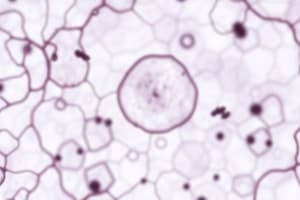Podcast
Questions and Answers
What is the primary mechanism by which organisms adapt to their environment over generations?
What is the primary mechanism by which organisms adapt to their environment over generations?
- Natural selection (correct)
- Genetic drift
- Variation in DNA
- Environmental changes
What is the study of the interactions between organisms and their environments called?
What is the study of the interactions between organisms and their environments called?
- Physiology
- Zoology
- Ecology (correct)
- Microbiology
Which of the following is a level of ecological organization?
Which of the following is a level of ecological organization?
- Population (correct)
- Symbiosis
- Species
- Morphology
Which biological discipline focuses on microscopic organisms?
Which biological discipline focuses on microscopic organisms?
What does biological diversity, or biodiversity, encompass?
What does biological diversity, or biodiversity, encompass?
Which of the following is NOT a key feature characterizing life?
Which of the following is NOT a key feature characterizing life?
What type of cells lack membrane-bound organelles?
What type of cells lack membrane-bound organelles?
Which domain includes organisms such as plants and fungi?
Which domain includes organisms such as plants and fungi?
What is the fundamental unit of life?
What is the fundamental unit of life?
Which of the following organelles is involved in energy production?
Which of the following organelles is involved in energy production?
Which molecule is primarily responsible for the transmission of genetic information?
Which molecule is primarily responsible for the transmission of genetic information?
What is the main focus of genetics?
What is the main focus of genetics?
What does evolution refer to in biological terms?
What does evolution refer to in biological terms?
Flashcards
What is a cell?
What is a cell?
The fundamental unit of life, containing all the necessary components for life.
What is a prokaryotic cell?
What is a prokaryotic cell?
A type of cell that lacks a nucleus and other membrane-bound organelles. They are simpler and typically found in bacteria and archaea.
What is a eukaryotic cell?
What is a eukaryotic cell?
A type of cell that has a nucleus and other membrane-bound organelles. They are more complex and found in plants, animals, fungi, and protists.
What is evolution?
What is evolution?
Signup and view all the flashcards
What is biology?
What is biology?
Signup and view all the flashcards
What is a genome?
What is a genome?
Signup and view all the flashcards
What is heredity?
What is heredity?
Signup and view all the flashcards
What is a genetic mutation?
What is a genetic mutation?
Signup and view all the flashcards
Ecology
Ecology
Signup and view all the flashcards
Phylogenetic tree
Phylogenetic tree
Signup and view all the flashcards
Biodiversity
Biodiversity
Signup and view all the flashcards
Natural selection
Natural selection
Signup and view all the flashcards
Physiology
Physiology
Signup and view all the flashcards
Study Notes
Fundamental Concepts
- Biology is the scientific study of life, encompassing a vast range of topics from the smallest molecules to the largest ecosystems.
- Life is characterized by key features: organization, metabolism, growth, reproduction, adaptation, responsiveness, and homeostasis.
- The scientific method is crucial in biological research, using observation, hypothesis formation, experimentation, data analysis, and conclusion drawing to understand natural phenomena.
Domains and Kingdoms
- Living organisms are categorized into three domains: Bacteria, Archaea, and Eukarya.
- The Eukarya domain includes kingdoms like Protista, Fungi, Plantae, and Animalia. Each kingdom has unique structural and functional adaptations.
Cell Structure and Function
- The cell is the fundamental unit of life.
- Two main cell types are prokaryotic and eukaryotic. Prokaryotic cells are simpler, lacking membrane-bound organelles, while eukaryotic cells are more complex and contain a nucleus and other organelles.
- Key eukaryotic organelles include: nucleus, mitochondria, endoplasmic reticulum, Golgi apparatus, lysosomes, vacuoles, and chloroplasts (in plant cells). Each organelle performs specific cellular functions.
- Specialized cell membranes control what enters and exits the cell. The cytoplasm, the internal environment, facilitates crucial biochemical reactions.
Molecular Biology
- This field focuses on life's essential molecules, including DNA, RNA, and proteins.
- DNA, the genetic material, stores the instructions for building and maintaining an organism. RNA plays a role in protein synthesis.
- Proteins have various functions: structural support, enzymatic catalysis, and cell signaling. These molecules interact through complex mechanisms.
Genetics
- Genetics studies heredity and variation. Inheritance of traits from one generation to the next is based on genetic information in DNA, encompassing Mendelian and modern molecular genetics.
- Inheritance patterns can be complex, varying by gene types (e.g., dominant, recessive, codominant, sex-linked).
Evolution
- Evolution is the change in population characteristics over time. Natural selection is a driving mechanism, adapting organisms to their environments over generations.
- Phylogenetic trees depict evolutionary relationships and common ancestry of species.
Ecology
- Ecology studies the interactions between organisms and their environments.
- Ecological organization levels span from individual organisms to populations, communities, and ecosystems.
- Key ecological concepts include biodiversity, ecosystems, nutrient cycling, trophic levels, and energy flow through ecosystems.
Other Biological Disciplines
- Microbiology focuses on microscopic organisms: bacteria, fungi, viruses, and protozoa.
- Physiology investigates processes within living organisms, from cells to entire systems.
- Biochemistry studies the chemical processes in living things.
- Zoology studies animals, and botany studies plants.
Biological Diversity
- Biological diversity, or biodiversity, encompasses the variety of life, from genes to ecosystems.
- Factors influencing biodiversity and conservation methods are important contemporary biological topics.
- Biodiversity's role for ecosystem health and human well-being is a significant research area.
Studying That Suits You
Use AI to generate personalized quizzes and flashcards to suit your learning preferences.




